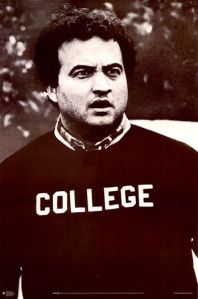
Sometimes, you find yourself stuck between two worlds…and it’s beautiful. Like seeing
Cirque du Soleil. Sometimes, you find yourself in just the right place at the right time. I had one of those experiences recently. It just hit home this weekend when I traveled north.
When the weather gets hot in Texas, it’s always a nice break to travel to Minnesota to see family. I attended a wedding. I got to experience both rain and cooler temperatures. It was a nice break.
As the weekend was winding down, I stopped by my brother’s house. Our talk shifted to the upcoming graduation ceremony for my niece. She will be wearing several medals when she walks. One they really wanted me to see was the choir medal.
My niece is a special needs child. She has flourished in the Minnesota public education system. She has two parents that act effectively as her advocates. That is necessary in any case, but it became crucial when it came to the choir. Her older sister was musically and intellectually gifted. She experienced the spoils of singing in the top choir. The biggest reward was singing at the end of the year in the high school’s “Moment in Time” concert. The concert was presented by the top two choirs each year. Both were open to juniors and seniors. Both were open-audition choirs.
After three years, my niece was in the 9
th grade Treble Choir as a senior. That presents two major issues. First, there is an obvious stigma being the only senior in a 9
th grade choir. Second, it meant that my niece would never get to sing at that one, special concert. My brother’s frustration (and my sister-in-law’s frustration) was that she would not be placed in the second-tier choir, even as a senior who stuck with the program for over three years. The choir directors had no intention of putting my niece in a “select” choir. It was amazing the lengths they were willing to go to ensure the “safety” of that second choir.
Over the next four months, I received phone calls soliciting my advice. I’m in a unique position. I was a music teacher for seven years and a music professor for four. I also knew a lot about federal education law because of my position at TSTA. I drafted letters and recorded testimonies. I consulted. At times, it seemed I counseled. At one point, she was pulled out of a class with no notice for an audition. Her parents were beside themselves. I got to play the good-news guy. I knew we had won the battle. You’d never do that to a special needs kid unless she was going to make it in.
She did. With the understanding that she would not be participating during the “contest” part of the school year. Fine. Whatever.
Then the contest part of the calendar passed, and she still had not been reinstated. Phone calls. Pressure. Principal
and assistant principal are gone. Choir directors say it’s too late to bring her back in at this point. New battle. Practically a war. Eventually, we won that one, as well. Never sure how my niece will look back on all of this, but the end result was pretty special. They really wanted me to see
that particular medal. That was me (in part). I helped make that happen. They started to talk about that concert, and they trailed off mid-sentence…
You get misty-eyed when you are the parent of a graduating senior. I didn’t see the concert, but I can tell that night will now be forever history in our family. Those two parents would have traded tickets to Springsteen, U2, Lady Gaga, Kanye, and the 1987 Twins World Series victory in Game 7 to see their daughter in that one high school concert. It was a big battle and a bigger victory.
The frustration is still there. When he regained his composure, he told me, “I’m still going to write it out.” The question, he rightly noted, is how schools should mesh the requirements and intents of the Individuals with Disabilities Education Act with the intentions and advantages that come from a pure, open-audition choir.
The question is easy to ask. It’s miserable to answer. This particular situation illustrates it so perfectly. Both of my nieces deserved this incredible concert experience. The music education community needs to find ways to make these opportunities--the
real opportunities--available to everyone. And do this while keeping those qualities that make such experiences so special.
That takes a balancing act similar to
Cirque du Soleil. I’m glad that the acrobats who were in play were able to keep everything balanced.
A dad should be able to feel misty-eyed.
 Teach for America, Inc. will collect $55,000 for each Ohio teacher.
Teach for America, Inc. will collect $55,000 for each Ohio teacher.


























